Solemnity of Christ the King Year C
Sunday November 23, 2025

Christ Reigns with Love
The Solemnity of Christ the King Year C reminds us that Jesus is the true King. His rule is not about power or wealth. It is about love, mercy, and peace. He leads us by giving His life for us. This feast helps us see what real kingship means in God’s eyes.
On this day, we remember that Jesus is the head of all creation. Everything belongs to Him. Yet He chooses to care for us as a shepherd cares for his sheep. The Solemnity of Christ the King Year C calls us to follow His way of kindness and service.
This feast also gives us hope. Christ’s kingdom is not broken or temporary. It is forever, and He invites us to be part of it. When we live in His love, we share in the joy of His kingdom, both now and in the life to come.
Mass Readings for the Solemnity of Christ the King Year C
- First Reading – 2 Samuel 5:1-3: The tribes of Israel came to David in Hebron, recognizing his leadership. They made an agreement before the Lord, and David was anointed king of Israel.
- Responsorial Psalm – Psalm 122: We rejoice as we go to the house of the Lord in Jerusalem, where the tribes gather to give thanks and the thrones of judgment are set.
- Second Reading – Colossians 1:12-20: Let us thank the Father for rescuing us and bringing us into the kingdom of his Son, Jesus, who is the image of God and the head of the church.
- Gospel – Luke 23:35-43: Rulers and soldiers mocked Jesus on the cross, challenging him to save himself. One criminal joined in, but the other defended Jesus and asked to be remembered. Jesus promised him a place in Paradise.
The readings above are for lectionary cycle C. For other years see the links below:
Christ the King Year A
Christ the King Year B
Jesus, remember me when you come into your kingdom.
Luke 23:42
Themes for the Solemnity of Christ the King Year C
The Solemnity of Christ the King Year C reminds us that Jesus is our true King. His kingdom is different from earthly kingdoms because it is built on love, mercy, and sacrifice.
- Jesus as King: Jesus is not a king who rules with power and force. He leads with love, humility, and service.
- God’s Kingdom is Eternal: Earthly rulers come and go, but Jesus’ kingdom will never end. His rule is one of peace and justice.
- Salvation Through Jesus: The second reading reminds us that Jesus rescues us from sin. He brings us into his kingdom and makes us part of his family.
- Mercy and Forgiveness: Jesus forgives the criminal on the cross. His kingdom is open to all who turn to him with faith.
- Humility and Suffering: Jesus does not save himself from the cross. His suffering shows that true kingship is about sacrifice, not power.
- Faith in Jesus: The good thief believed in Jesus even when others mocked him. His faith brought him the promise of eternal life.
The Solemnity of Christ the King Year C reminds us that Jesus is a different kind of king. He rules with love, mercy, and justice, and his kingdom will never end.
Resources for the Solemnity of Christ the King Year C
Sunday November 23, 2025

Choosing Voices Lesson Plan
This lesson helps teens think about the voices they hear in life—some that pull them away from God, and some that lead them toward Him. Using the story from Luke 23:35-43, it shows how one thief on the cross mocked Jesus, while the other asked for mercy. Teens are invited to see that they, too, can turn to Jesus, even in hard times.
The Gospel for the Solemnity of Christ the King Year C reminds us that Jesus rules with love, even from the cross. The Good Thief didn’t have fancy words—just an honest prayer. Jesus answered with a promise of heaven. This lesson shows youth that it’s never too late to choose faith, and Jesus is always ready to listen.
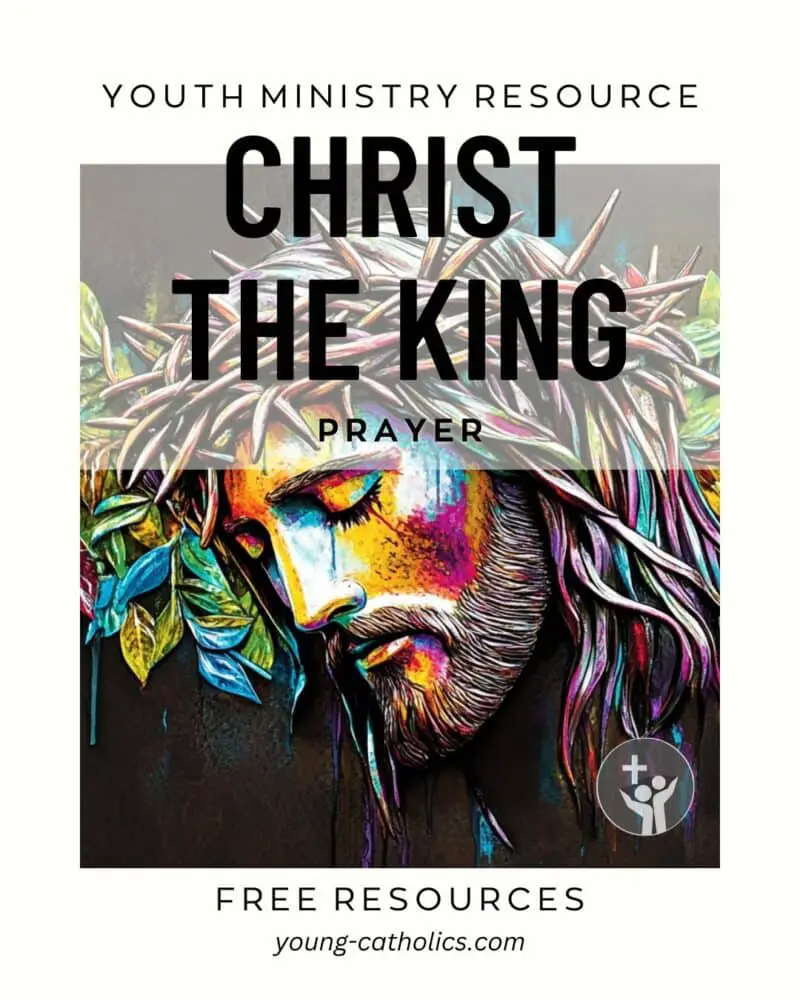
Prayer to Christ the King
The Prayer to Christ the King honors Jesus as the ruler of all and asks for his mercy, justice, and protection. It reminds us that his kingdom is not about earthly power but about truth and love. This prayer is a way to express trust in Jesus and to recognize him as the one who leads us.
The Solemnity of Christ the King Year C celebrates Jesus as the true King, and this prayer fits well with that message. It helps us turn to him for guidance in our lives and to ask for strength in faith. Praying it can deepen our commitment to follow Christ and live by his teachings.
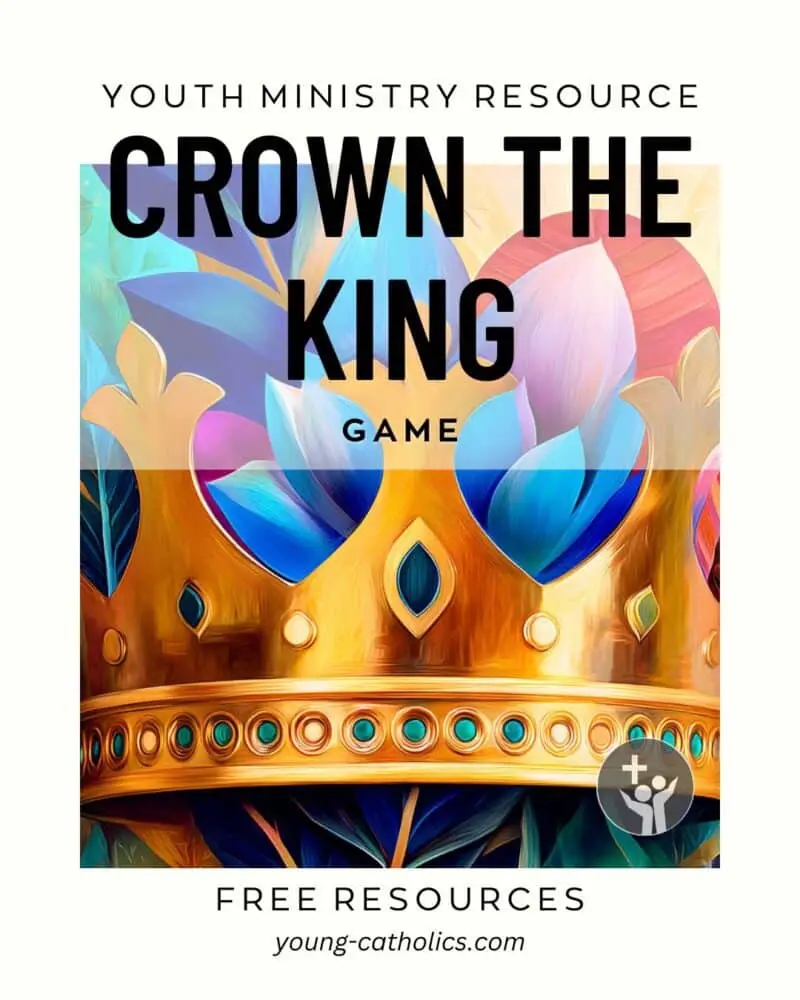
Crown the King
Crown the King is a fun and active game that encourages teamwork, strategy, and friendly competition. Players must defend their crowns while trying to knock off others, making it a game of skill and quick thinking. It is a great way for youth groups to bond, stay active, and enjoy friendly play.
The Solemnity of Christ the King Year C reminds us that Jesus is the true King, not because of power but because of his love and sacrifice. This game can help youth reflect on what it means to follow Christ as King. Just as players protect their crowns, we are called to keep Jesus at the center of our lives.
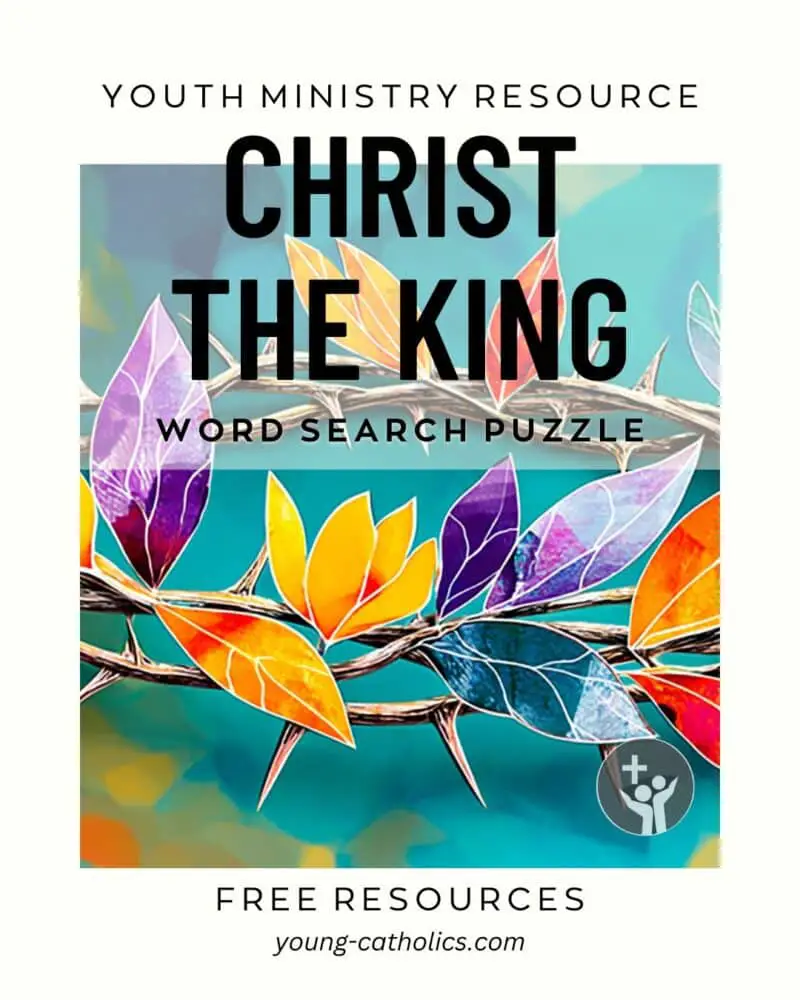
Christ the King Word Search Puzzle
This word search is a fun way to explore important words related to Jesus as King. It includes terms from his Passion, his sacrifice, and his promise of salvation. It is a great activity for youth groups, families, or anyone who wants to focus on the meaning of Christ’s kingship.
The Solemnity of Christ the King Year C reminds us that Jesus reigns with love and mercy, not with force. Words like “King,” “Forgive,” and “Paradise” show how his rule is different from earthly kings. This puzzle can help us remember his sacrifice and the promise of his kingdom.
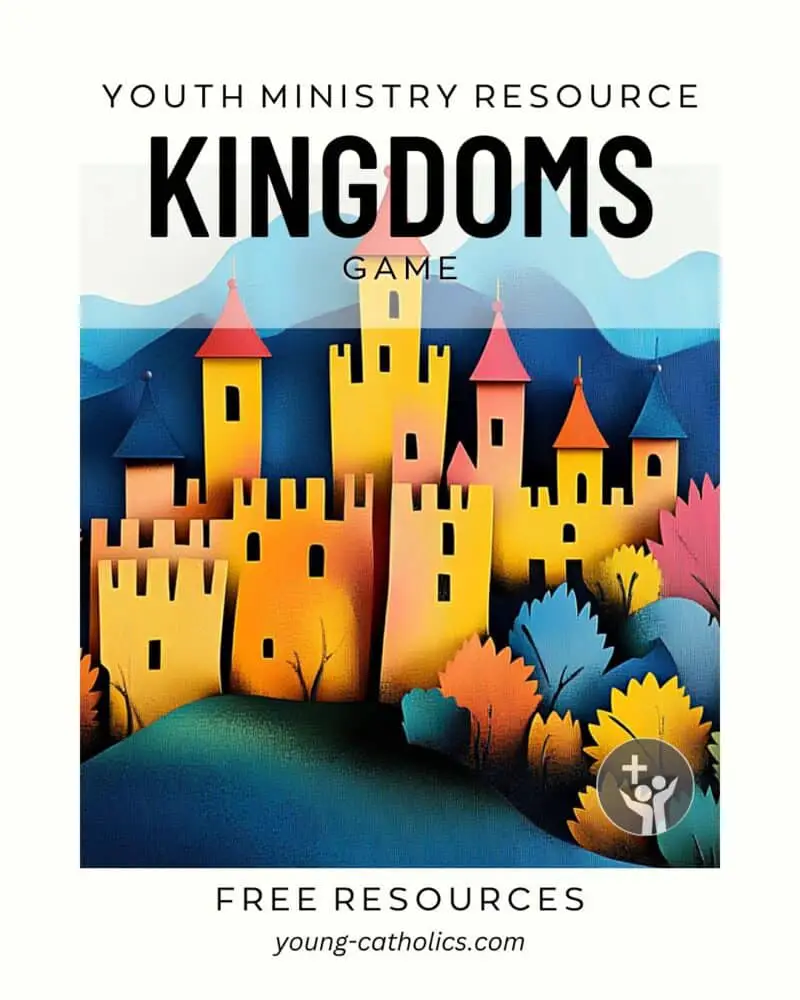
Kingdoms Game
The Kingdoms game is a fun way for youth to build memory skills, teamwork, and strategy. Players form kingdoms by remembering words and making good choices. The game is exciting because no one knows who will end up with the biggest kingdom. It encourages friendly competition and helps players work together.
The Solemnity of Christ the King Year C reminds us that Jesus is the true King who leads with wisdom and love. This game can help youth think about what it means to follow a good leader. Just as players trust their king in the game, we are called to trust and serve Jesus.
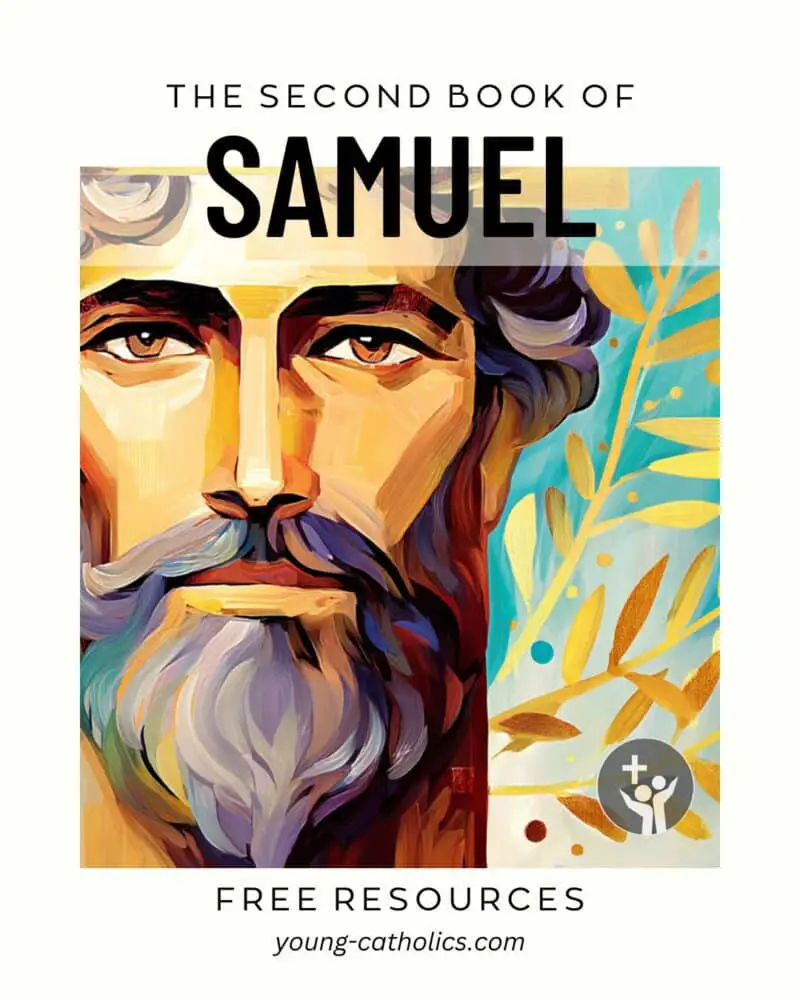
The Second Book of Samuel: David Chosen as King
This reading from 2 Samuel shows Israel uniting under David’s rule. The tribes recognize God’s choice and confirm David as king in Hebron. It reflects the book’s focus on God’s covenant and His guidance in raising leaders for His people.
The agreement before the Lord highlights David’s kingship as part of God’s plan, not human ambition. This moment points to God’s faithfulness in establishing a kingdom rooted in His will, an important theme for the Solemnity of Christ the King Year C.

Psalm 122: Joy in God’s City
Psalm 122 celebrates Jerusalem as the place where God’s people come together. It shows the importance of worship, unity, and thanksgiving in Israel’s life. The joy of going to the house of the Lord reminds the people that God’s presence is at the center of their faith.
The psalm also speaks of peace and justice, with thrones of judgment set in Jerusalem. It connects to the Solemnity of Christ the King Year C by pointing to Christ, the true King, who brings lasting peace and gathers His people into God’s presence.

The Letter to the Colossians: Christ, Head of All Things
The letter to the Colossians praises God for bringing believers into the kingdom of His Son. It reflects the book’s focus on Christ’s supremacy and His role as the head of the church. Jesus is the image of God, showing the fullness of God’s plan for salvation.
This passage links directly to the Solemnity of Christ the King Year C, as it reminds us that all creation is under Christ. His kingdom is not political but eternal, marked by redemption and peace for those who trust in Him.

The Gospel of Luke: The King on the Cross
Luke shows Jesus as the true King, even while suffering on the cross. The Gospel often highlights God’s mercy for the humble and rejected, and here a repentant criminal receives the promise of Paradise.
This moment reveals the heart of Christ’s kingship. He saves not through force but through love and forgiveness. The Solemnity of Christ the King Year C reflects this truth, as we honor the King who rules by serving and giving His life for all.
Find more about the Gospel of Luke and Jesus’ saving mission
Homilies and Commentaries for the Solemnity of Christ the King Year C
Sunday November 23, 2025
King of All, Warrior of Mercy
Bishop Barron’s homily for the Solemnity of Christ the King Year C explains that Jesus is a different kind of king. Like David, he unites his people, not just through leadership but in his very person. His kingdom is not based on political power but on love and sacrifice. He draws all people to himself and establishes a unity that goes beyond human divisions.
Jesus is also a warrior king, but he does not fight with weapons or violence. He battles the powers of sin and darkness through self-giving love and forgiveness. His greatest victory is on the cross, where he absorbs evil and responds with mercy. His army is made up of those who follow him in love and service. The Solemnity of Christ the King Year C challenges everyone to choose whether to follow Christ or the ways of the world.
King of Our Hearts
Jeff Cavins’ commentary for the Solemnity of Christ the King Year C focuses on how Jesus is the true King, even when people fail to recognize him. He explains that in the Old Testament, David was anointed as king, but the people did not acknowledge his kingship right away. In the Gospel, Jesus is mocked on the cross, yet one criminal sees the truth and asks to be remembered in his kingdom. Like them, we must recognize Jesus as King and invite him to rule in our hearts.
The Solemnity of Christ the King Year C is a call to examine our lives and ask if Jesus truly reigns over our thoughts, actions, and choices. Cavins challenges us to put Jesus first in everything, not just in words but in how we live. Seeking his kingdom above all else brings peace and purpose. Like the good thief, we must turn to Jesus and trust in his kingship.
Kingdom of the Son
Scott Hahn’s commentary for the Solemnity of Christ the King Year C highlights how Jesus is recognized as King, even by those who mock him. In the Gospel, rulers, soldiers, and a criminal insult him, but the good thief sees the truth. He confesses his sins, asks for mercy, and is saved. Jesus does not use his power to save himself but gives his life to save others.
The Solemnity of Christ the King Year C reminds us that Jesus’ kingdom is not based on earthly power but on sacrifice and love. Through his death, he brings us into his kingdom, which is the Church. Just as Israel became one with David, we become one with Christ through the New Covenant. In every Eucharist, we renew this bond and look forward to the day we will be with him in paradise.
Reflection for the Solemnity of Christ the King Year C
The Solemnity of Christ the King Year C helps us see Jesus as a different kind of king. He does not rule with force or seek power for himself. His kingdom is based on love, mercy, and sacrifice. The readings show how his kingship is not like earthly rule. He frees us, welcomes us, and calls us to follow him.
Not What They Expected
The Solemnity of Christ the King Year C reminds us that Jesus was not the king people expected. Many hoped for a strong leader who would free them from Roman rule. They wanted a king like David, who would fight their enemies and restore their nation. But Jesus did not come as a warrior. He came as a servant, preaching love and forgiveness.
In the Gospel, the rulers and soldiers mocked Jesus as he hung on the cross. They challenged him to save himself if he was truly the King. They expected a king who would use power to escape suffering. But Jesus showed his kingship in a different way. He accepted the cross and forgave those who hurt him.
Jesus frees us in a way no earthly ruler can. He frees us from sin, fear, and death. He calls us to live in his kingdom by caring for others, especially those who are weak or rejected. His rule is not about force but about love.
Following Jesus means trusting in God, even when life is hard. It means loving others, even when it costs us something. Jesus shows us that true freedom comes from giving ourselves to God and serving others. This is what it means to live in his kingdom.
The Solemnity of Christ the King Year C challenges us to recognize Jesus as our King. He does not rule with violence or power but with love and sacrifice. His way is not always easy, but it is the way to true peace and joy.
God’s Kingdom is Eternal
The Solemnity of Christ the King Year C reminds us that Jesus’ kingdom will never end. Earthly rulers rise and fall, but Jesus is King forever. His kingdom is built on peace, justice, and love. It is not limited by time or place.
In the first reading, the people of Israel anointed David as their king. His rule was important, but it was temporary. All human leaders eventually pass away, and their kingdoms change. But Jesus is not just a human king. He is the ruler of all creation, and his reign has no end.
The second reading from Colossians tells us that Jesus is the head of the Church and the image of God. Everything was created through him and for him. His kingdom is not like the kingdoms of the world. It is not based on power or wealth but on love and mercy.
In the Gospel, one of the criminals on the cross recognized Jesus as King. He asked Jesus to remember him, and Jesus promised him a place in his kingdom. This shows that Jesus’ kingdom is not just for the powerful or important people. It is for anyone who turns to him in faith.
The Solemnity of Christ the King Year C invites us to put our trust in Jesus. His kingdom is not of this world, but it is real and lasting. When we follow him, we become part of something greater than anything this world can offer.
Jesus Offers Mercy
The Solemnity of Christ the King Year C shows us that Jesus is a king of mercy. He does not rule with fear or punishment. He rules with kindness and forgiveness. He invites everyone into his kingdom, no matter their past.
In the Gospel, two criminals were crucified with Jesus. One insulted him, but the other defended him. The second criminal admitted his guilt and asked Jesus to remember him. Jesus did not reject him. Instead, he promised him a place in paradise.
This moment shows the heart of Jesus’ kingship. He does not turn away sinners. He welcomes those who seek him. He does not ask for great achievements or perfect lives. He asks for faith and trust.
The second reading also speaks of Jesus rescuing us and bringing us into his kingdom. He does not force us in. He invites us with love. His mercy is for everyone who accepts him as King.
The Solemnity of Christ the King Year C reminds us that Jesus is always ready to forgive. No matter how far we have fallen, he welcomes us back. His kingdom is built on mercy, and he calls us to show the same mercy to others.
Jesus is the King who brings peace, justice, and mercy. His kingdom will never end. He invites us to trust in him and live by his example. The Solemnity of Christ the King Year C reminds us to follow his way, even when it is difficult. When we do, we become part of his everlasting kingdom.
Prayer
Lord Jesus, you are our King. Your rule is not about power but about love. Help us to follow you and trust in your ways. Teach us to serve others and to live in your kingdom each day. Fill our hearts with faith and mercy. Amen.
Reflection Questions for the Solemnity of Christ the King Year C
- How is Jesus’ kingship different from earthly rulers?
- What does it mean for Jesus to be your King?
- How does the Gospel reading show Jesus’ mercy?
- Why do you think people had trouble accepting Jesus as King?
- What does Jesus’ kingdom look like in your life?
- How can you show love and mercy like Jesus?
- What does the good thief teach us about faith?
- How do you see God’s kingdom growing in the world?
- What sacrifices does Jesus ask us to make?
- How can you trust Jesus more in your daily life?
Quotes and Social Media Graphics for the Solemnity of Christ the King Year C
The King Who Suffers for Us

Bring this powerful image of Christ the King to your parish community. Perfect for bulletins, newsletters, or teaching resources, it serves as a reminder that Jesus reigns through love and sacrifice.
Share this image to inspire faith and reflection during the Solemnity of Christ the King and throughout the year.
Paid subscribers may download a large copy this digital artwork without watermarks, suitable for use in bulletins, social media, newsletters, etc., free of charge by clicking here. You must be logged in as a paid subscriber to access the file.
Only current paid subscribers have the rights to use the artwork.
Music Suggestions for the Solemnity of Christ the King Year C
Sunday November 23, 2025
The music selections for the Solemnity of Christ the King Year C reflect themes of Jesus’ kingship, glory, and reign. Some songs focus on praising Jesus as the King of all creation, just as the readings show his authority over heaven and earth. Others highlight his sacrifice and love, reminding us of the good thief who recognized him on the cross. There are hymns that call us to rejoice in his kingdom, just as the psalm speaks of going up to Jerusalem with joy. Some songs invite us to worship and surrender to Jesus, following the example of those who accept him as King. Whether traditional or modern, these songs help us honor Jesus as the true King who leads us in love and mercy.
- Alleluia Sing to Jesus by Rowland H. Pritchard, William C. Dix, Robert E. Kreutz & Randall Debruyn
- All Glory, Laud and Honor by Melchior Teschner & Theodulph of Orleans
- Amazing Love / You Are My King by Newsboys
- Come, Now Is the Time to Worship by Brian Doerksen
- Crown Him with Many Crowns by George J. Elvey
- Doxology by Ken Canedo
- Forever Reign by Hillsong Worship
- Here As in Heaven by Elevation Worship
- Here Is Our King by David Crowder Band
- Hosanna by Hillsong United
- King of My Heart by Greg Walton
- Let Us Go Rejoicing by Steve Angrisano
- Lift High the Cross by Sydney H. Nicholson
- Majesty by Michael W. Smith
- Mighty to Save by Laura Story
- Our God Reigns (How Lovely on the Mountains) by Ingrid DuMosch & The London Fox Singers
- Our God Reigns by Jesus Culture
- Praise to the Lord the Almighty
- Psalm 122: Let Us Go Rejoicing by Rawn Harbor
- Psalm 122: Let Us Go Rejoicing by Bob Hurd
- Psalm 122: Let Us Go Rejoicing by Curtis Stephan
- Sing Hosanna to Our King by John Angotti
- The King of Glory by Willard F. Jabusch & Randall Debruyn
- The King Shall Come When Morning Dawns by Randall Debruyn & John Brownlie
- The Servant King by Graham Kendrick
- To Jesus Christ Our Sovereign King by Martin B. Hellriegel
Music directors and musicians can use these selections to bring the themes of the Solemnity of Christ the King Year C to life. These songs can inspire worship and help the congregation reflect on Jesus’ kingship. Try incorporating these into the liturgy and see how they fit with the readings and prayers. If you have other music ideas that celebrate Christ as King, share them in the comments.
Questions and Answers for the Solemnity of Christ the King Year C
What is the main message of the first reading?
The first reading shows how the tribes of Israel accepted David as their king. This reminds us that Jesus is the true King who unites his people and leads them with love.
Why is Jesus compared to David?
David was a great king chosen by God to lead Israel. Jesus is the perfect King who rules forever, not just over a nation but over all people who follow him.
What does the second reading say about Jesus’ kingdom?
It tells us that Jesus’ kingdom is different from earthly kingdoms. His rule is based on love, peace, and saving people from sin.
Why is Jesus called the head of the Church?
Just as a head guides the body, Jesus leads the Church. He brings people together and gives them the strength to live in his kingdom.
Why do the rulers and soldiers mock Jesus in the Gospel?
They expect a king to be powerful and strong. They do not understand that Jesus’ power comes from his sacrifice and his love for others.
What does the good thief teach us?
He shows that no matter what we have done, we can turn to Jesus for mercy. His faith in Jesus gave him the promise of paradise.
Why does Jesus not save himself from the cross?
Jesus’ mission was to save others, not himself. By accepting suffering, he showed that true kingship is about sacrifice, not power.
What does the Solemnity of Christ the King Year C teach about leadership?
It teaches that true leaders serve others. Jesus is a King who leads with love and humility, not with force or control.
How can we live as followers of Jesus our King?
We can follow his example by loving others, forgiving, and serving those in need. Living in his kingdom means putting God first in our lives.
What does the Solemnity of Christ the King Year C mean for our daily lives?
It reminds us that Jesus should be at the center of everything we do. When we follow his teachings, we bring his kingdom into our homes, work, and relationships.
Why does the Solemnity of Christ the King Year C come at the end of the Church year?
It shows that everything in our faith leads to Jesus as King. It helps us reflect on whether we are truly following him before we begin a new Church year.
How do we make Jesus our King?
We let him guide our choices, trust him in hard times, and live by his teachings. When we do this, we make him the ruler of our hearts and lives.
Jesus is a Different King
The Solemnity of Christ the King Year C celebrates Jesus as the true King. Unlike earthly rulers, Jesus does not seek power, wealth, or control. He leads with love and mercy, offering salvation to all who follow him. His kingdom is not of this world but lasts forever.
The readings show how Jesus’ kingship is different. David was anointed king of Israel, but Jesus is the King of all creation. On the cross, he was mocked, yet he forgave and promised the good thief a place in his kingdom. His power is shown in his sacrifice and love.
This feast reminds us that Jesus’ kingdom is built on justice and peace. He does not rule with force but invites us to follow him. His example teaches us to live with faith, hope, and love.
Your Turn
The Solemnity of Christ the King Year C invites us to reflect on what it means for Jesus to be our King. His kingdom is not about power but about love and mercy. He calls us to trust in him and live as his followers.
Take time to think about the readings for this feast. What do they say to you? How do they shape your faith? Share your thoughts and experiences in the comment section.


Leave a Reply